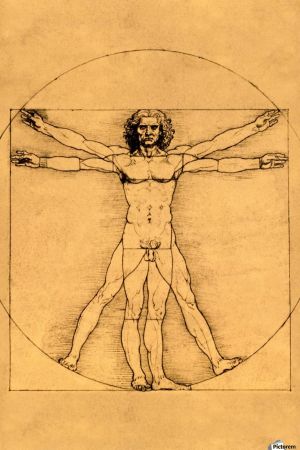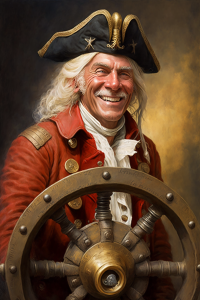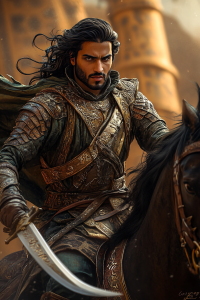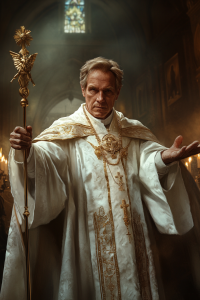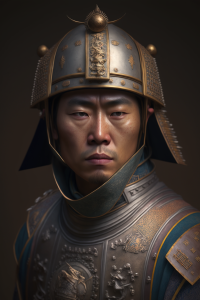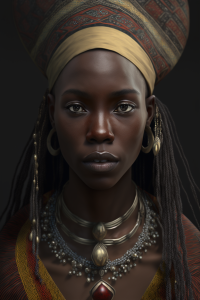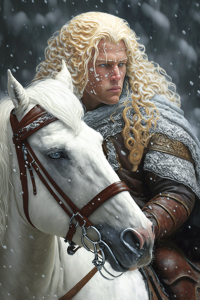Difference between revisions of "Human"
| Line 47: | Line 47: | ||
===[[Batistiktar]]=== | ===[[Batistiktar]]=== | ||
| − | [[File:Batistiktar.png|thumb|left|200px|A typical Batistiktar]] | + | [[File:Batistiktar.png|thumb|left|200px|A typical [[Batistiktar]]]] |
| − | The natives of western Otan known as the [[Batistiktar]], | + | The natives of western [[Otan]] known as the [[Batistiktar]], mainly inhabiting the country known as the [[Batis|Republic of Batis]]. Formerly a very withdrawn people, it came to the world's attention that the [[Batistiktar]] were exceptional farmers. It is said that, |
| + | "for every handful that a [[Batistiktar]] sews, he yields seven more." | ||
| + | The [[Batistiktar]] are also very talented with animal husbandry, raising bison, and other animals with high yields of meat. While they only harvest what they need, in recent years they have begun trading with neighboring [[Soltustik]], which needed supplies during the [[Grendel war]]. Their contribution during the war led to widespread knowledge of their agricultural prowess. It was not long before the [[Kuuliki Trade Company]] had established shipping routes to every major coastal city in the [[Batis|Republic of Batis]]. | ||
| + | |||
| + | At the present time, [[Batistiktar]] produced foodstuffs are shipped worldwide via the coastal routes and to [[Soltustik]] and [[Ælfgarade]] via land routes. The country's increased reliance on trade, for which they import everything from metal to magic, has caused them to sew and harvest many times what the country itself would consume. | ||
| + | |||
| + | The [[Batistiktar]] will sporadically practice [[Wodenism]] as a religion, but tend to prefer their own animistic religions with gods representing each of the major species of wildlife in [[Batis]]. This religion is passed through the oral tradition, and though it lacks the bookishness of other religions, it is rich in religious art. Symbols for the wolf, raven or orca can be recognized immediately by any [[Batistiktar]] and these symbols will often adorn their homes and holy places. | ||
| + | |||
| + | As adventurers, the [[Batistiktar]] produce an unsurprisingly high number of rangers, druids and rogues due to their close connection with the natural world. | ||
| + | |||
<br style="clear: both;"> | <br style="clear: both;"> | ||
Revision as of 14:17, 28 August 2021
| Race | Human |
|---|---|
| Subraces | 7 Subraces |
| Patron Deity | Woden and various others |
| Diet | Omnivorous |
| Lifespan | Usually up to 75 years, max 120 years |
| Location | Any |
| Language | Otani |
| Climate | Any |
| Terrain | Any |
| Height | 4'6" – 7'0" ( 137 – 213cm) |
| Weight | 80–300 lb (40–150 kg) |
| Skin Color | Variable, from White (rare) to Black (also rare) |
| Hair Color | White, Blonde, Brown, Red, Auburn, Black and Bald |
| Eye Color | Amber, Hazel, Blue, Green, Gray, Brown, and Red (rare) |
| Distinctions | Gregarious, noisy. |
| 5e Equivalence | Human |
| 5e Alignment | Any |
Humans are a bipedal race who like to shitpost on the Internet.
Racial Variants
There are seven cultural variants of humans. These variants are not divided by even lines and individuals may vary greatly within each group. Besides sharing a common culture and geographical base, these groups may also share common political ideologies, a religions, and in many cases physical traits.
Araldiktar
These islander people hail from the island nation of Araldar on the western edge of Otan. They are often easily identified by their western dialect of the Otani, their wind-beaten bronze complexions and dark features. The Araldiktar are naturally enamored with all things maritime and in particular the fruits of the sea.
The Araldiktar are often considered to be bilingual as they can nearly universally speak the Otani language but also the Araldar pidgin, which is a hybrid mixture of the Otani, Sweardælf and Ælfish languages. Araldar pidgin is spoken almost exclusively on the smaller Araldar languages.
Mujitism is the most common religion shared by the Araldiktar people. This sea-oriented religion is comprised of legends of a nautical nature with the heroes engaging with, or even becoming sea creatures. The morals of this religion affect Araldar culture giving lessons that involve respect for the sea and the creatures within.
The sea is the central source of food for the Araldiktar and naturally the people are therefore inclined to have deep understandings of what is to be at sea. From an early age, the Araldiktar will acquire nautical skills such as fishing, sailing and swimming among others. Araldiktar trades can include farming and other more traditional inland occupations, but more than half the population live adjacent to or on the sea at any given time. The highest paying occupations will typically involve a life at sea.
Batistiktar
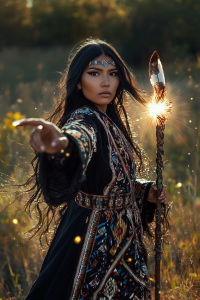
The natives of western Otan known as the Batistiktar, mainly inhabiting the country known as the Republic of Batis. Formerly a very withdrawn people, it came to the world's attention that the Batistiktar were exceptional farmers. It is said that,
"for every handful that a Batistiktar sews, he yields seven more."
The Batistiktar are also very talented with animal husbandry, raising bison, and other animals with high yields of meat. While they only harvest what they need, in recent years they have begun trading with neighboring Soltustik, which needed supplies during the Grendel war. Their contribution during the war led to widespread knowledge of their agricultural prowess. It was not long before the Kuuliki Trade Company had established shipping routes to every major coastal city in the Republic of Batis.
At the present time, Batistiktar produced foodstuffs are shipped worldwide via the coastal routes and to Soltustik and Ælfgarade via land routes. The country's increased reliance on trade, for which they import everything from metal to magic, has caused them to sew and harvest many times what the country itself would consume.
The Batistiktar will sporadically practice Wodenism as a religion, but tend to prefer their own animistic religions with gods representing each of the major species of wildlife in Batis. This religion is passed through the oral tradition, and though it lacks the bookishness of other religions, it is rich in religious art. Symbols for the wolf, raven or orca can be recognized immediately by any Batistiktar and these symbols will often adorn their homes and holy places.
As adventurers, the Batistiktar produce an unsurprisingly high number of rangers, druids and rogues due to their close connection with the natural world.
Ontustikter
These southern people are generally of a darker complexion from olive to pure black. Their most common feature, however is their devotion to Aspan, the god of the sky.
Ortalykshilar
These central plains people are a melting pot, of most of the people of Otan. Skin tones range from white to black with any of a range of features. The Ortalykshilar are far more likely than other humans on Otan to have business and personal relationships with other humanoids including, but not limited to elves, dwarves and even filthy, nasty orcs.
Sigis Turgindar
These eastern people practically worship quality craftsmanship, creating some of the best trade goods the world has to offer. Skin tones vary greatly from light pink to darkish brown, though generally paired with dark features.
Karazaliktar
These southern people are have largely dark skin and features. Variations exist, but are rare.
Soltustikter
Northerners range in skin tones from pinkish to pure white, with light features. Variations are rare though they tend to produce many half-elves.
Player Notes
| Copyright © 2021-2024 by Robyn Blaber and Will to Power Games. All rights reserved. Content on this website may not be reproduced without written permission of the copyright owner. |
